18 Mar 2014 | Asia and Pacific, News and features, Pakistan

(Image: Aleksandar Mijatovic/Shutterstock)
Pakistan’s record of abuse of its dubious blasphemy law has been criticised by a report from the US Commission on International Religious Freedom. The country currently has 14 individuals known to be on death row while 19 others are serving life sentences on charges of committing blasphemy.
Take for example the case of Aasia Bibi, accused of insulting the prophet Muhammad. The 45-year old Christian and mother of five says she was “falsely accused to settle an old score”. In jail since June 19, 2009, she has yet to have her appeal heard. Sameena Imtiaz, founder of Islamabad-based Peace Education Development Foundation (PEAD) says the commission’s findings are another “reminder of the religious intolerance that has permeated the society at large”. The hearing on March 17, before the Lahore High Court was “cancelled by order” yet again, informed her lawyer Mohammad Yasin Badar, who does not know the reason. “I got a text message from the court,” he said but surmises: “This is a very sensitive case.”
But while Bibi may be only Pakistani woman to have been sentenced to death for blasphemy, she is not alone. In November 2013, a 72-year old homeopath doctor Masood Ahmed, a British national of the minority Ahmadi sect, which has been declared non-Muslim by the constitution, was jailed for discussing Islam — a criminal offence punishable with death under Section 295-C of the Pakistan Penal Code (PPC). His conversation was filmed using a mobile phone in which he is seen reciting verses from the Quran. He has been released on bail. Then there is a mentally ill, 69-year-old British citizen, Mohammad Asghar, convicted in January this year, for sending letters proclaiming he was Prophet Mohammad. He remains in prison today.
The original blasphemy law, drawn up by the British and amended in 1986 by then-dictator General Zia-ul-Haq, puts in place a mandatory death sentence under section 295-C. Imtiaz says since the amendment more than a 1,000 cases have been registered against Ahmadis, Christians, Hindus and even Muslims.
The National Commission for Justice and Peace has also been keeping a close watch on the numbers. According to them, from 1987 to 2013, as many as 1,281 people have been charged, of which 616 are Muslims, 474 Ahmadis, 171 Christians and 20 Hindus.
Pakistan has never executed anyone under the offence but the between 1990 to 2012, several of the accused have been killed in associated vigilante violence outside the courts or in prisons.
According to a report by the Islamabad-based Center for Research and Security Studies, since 1990, extra judicial murders of 52 accused have taken place.
In its State of Human Rights in 2012 report, the independent Human Rights Commission of Pakistan states: “Abuse of the blasphemy law continues to take a heavy toll in terms of human lives and harassment of citizens.”
“The sheer number of cases registered in the past 25 years suggests the law has been widely abused,” concedes Imtiaz, adding that investigations have revealed that often the reasons for the abuse stem from personal enmity, property disputes, religious hatred.
“Decades have passed but none of the governments that followed, found the courage to repeal the discriminatory laws that have contributed significantly to intolerance, violence, bigotry, hate and injustice in the country,” says Bushra Gohar, a senior member of the Awami National Party. A legislator in the last assembly, she had submitted a bill in the assembly for the repeal of the blasphemy clauses inserted by Zia ul Haq, but it was never tabled in the assembly.
And for that reason, says Imtiaz there was an urgent need for debate to include “all segments of society on the pros and cons of the law and how it is abetting religious intolerance”.
In the meantime, she said, “an effective counter law that prohibits the abuse of the law for settling personal gains and inciting hatred” should be implemented. “The current law is not only vague but is rarely put to use due to fear of persecution and pressures,” she points out.
There have been half-hearted attempts to initiate a debate but after two high profile assassinations — of Punjab governor, Salman Taseer and minister for minorities, Shahbaz Bhatti — took place, for speaking on Bibi’s behalf and opposing the blasphemy laws, all efforts have been stalled.
“Political expediency, compromise and appeasement of a handful of religious extremists have prevented each subsequent government to initiate a meaningful debate, or even initiate pertinent legislation in the parliament to repeal or amend the discriminatory laws that continue to play havoc with the lives of women, minorities and the poor,” Gohar said.
Citing the recent torching of a temple in Larkana, in Sindh over blasphemy allegations, she says: “It shows how easy it is to incite mob violence and as in numerous similar cases in the past the root cause will not be addressed.”
According to the former legislator, strong political will is seriously lacking to review and amend or repeal the blasphemy law. “We cannot hope for justice for the victims and their families if we cannot even have an open debate on the discriminatory laws in the parliament and if the parliament, the courts and the government are threatened, coerced and silenced by a bunch of religious extremists.”
The annual report prepared by the Commission on International Religious Freedom looks at the state of religious freedom around the world.
This article was posted on March 18, 2014 at indexoncensorship.org
13 Mar 2014 | India, News and features, Pakistan
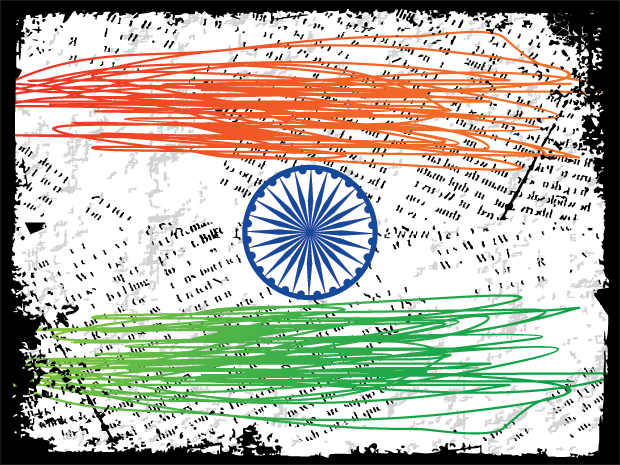
Improbable as it may seem, but 67 Kashmiri university students were briefly charged with sedition for cheering for Pakistan, and celebrating its win over India, during an Asia Cup cricket match in early March.
Sections of the Indian Penal Code that they were charged under were the following:
Section 124a – “Whoever by words, either spoken or written, or by signs, or by visible representation, or otherwise, brings or attempts to bring into hatred or contempt, or excites or attempts to excite disaffection towards the Government established by law..”
Section 153 – “Whoever malignantly, or wantonly by doing anything which is illegal, gives provocation to any person intending or knowing it to be likely that such provocation will cause the offence of rioting to be committed shall..”
Section 427 – “Whoever commits mischief and thereby causes loss or damage to the amount of fifty rupees or upwards..”
The students were watching the match in Meerut, at the Swami Vivekanand Subharti University when the ruckus started. According to conflicting reports, the hooting of the Kashmiri students at Pakistan’s win caused those supporting India to chase them and throw stones at their rooms. The Kashmiri students protested the next day, but the university officials suspended them for three days as “resentment was growing in other hostels because of their behavior.” The police charged them under the Indian Penal Code. After a public outcry, the Uttar Pradesh police dropped the charges, however, there is a battle of words between the police and university officials as to who initiated the charges against the students.
The incident, once again, has exposed the fragile faultlines between Kashmir and India – and the perceived disloyalty of the Kashmiri Muslims to India. The controversy has brought about some harsh reactions, including a tweet by famous lyricist Javed Akhtar that said – “Why the suspension of those 67 Kashmiri students who cheered Pakistan is revoked. They should be rusticated and sent back to Kashmir.” Others, like Shivam Vij, took a more nuanced position, stating that, “not taking action against them would have escalated the violence at the university and in the city. The Indian students at the university were responding with the same sentiment that makes Kashmiri Muslims suspect their Hindu minority: the sentiment of nationalism. How acceptable would it be to a Pakistani if some in Pakistan openly and publicly cheered for the Indian cricket team in a match against Pakistan?”
Tidbits from Kashmir also help cement this view of the Muslims from the Kashmir Valley to the rest of India. Reports that firecrackers celebrated Pakistan’s win all night, and that a skirmish between Indian army personnel and local Kashmir youth celebrating the results of the match ended in a stabbing. There have also been defiant editorials from Pakistan countering the action against the students, declaring that, “it is not the win of Pakistan but the loss of India against any cricket playing nation that revives interest for cricket in Kashmir. India’s loss is a temporary relief from all the melancholy and grief that the people of Kashmir go through on a daily basis, inflicted by the Indian state and its military architecture.”
While this incident in question might have, on the surface, been about cricket and extremely ungentlemanly behavior, very quickly it seemed to have translated into politics as usual. A outcry about serious charges against university students – Kashmiris who had travelled far from home to obtain an Indian degree – was raised by many Indians in the media, by the Chief Minister of Jammu and Kashmir, and international groups. Many of these students were in Meerut given under the PMSSS, or the Prime Minister’s Special Scholarship Scheme, meant to enhance job opportunities for Kashmiri youth, meant mainly for low-income families. This is part of a larger drive to assimilate Kashmiri youth into the mainstream economic and educational life of India.
Indian Express’s Shekhar Gupta lamented the controversy given cricket’s globalized nature where it is increasingly normal to cheer for favourite player from another country. Instead he feels that “India’s majority has a minority complex” and this is coming to the fore “when the BJP is surging ahead, and not because of any mandir, tension with Pakistan, or rash of terror attacks. And when, in fairness, you have to acknowledge that there isn’t even a vaguely communal appeal in its leader Narendra Modi’s campaign message. India has had a 13-year period of total peace, unprecedented in its independent history. There has been a steep decline in terror incidents. Even the Maoists seem to be shrinking slowly. And yet, our level of jingoism is as if we were approaching an imminent war, as if India were under siege, its borders getting violated with impunity, the enemy at the gates.” Many echo Gupta’s view, fearing that those who believe the BJP under Narendra Modi will form government after the elections in April 2014, might be quick to adopt the jingoistic Hindu nationalism the party was based on.
Adding a layer to this incident is an interesting point of view offered by journalist Prayaag Akbar who writes about India’s many Muslims who feel affinity towards Pakistani cricket team, but are rarely called out for it, unlike the Kashmiri Muslims. He writes – “that some Indian Muslims, not just Kashmiris, support Pakistan during cricket matches must be acknowledged. But categorisation is self-fulfilling, some will say, and sport excites tribalism. It does not immediately follow—and this seems to be the consideration at the crux of the issue—that they will support Pakistan in a war against India. Yet it does not immediately follow that they will not, either. No one on either side of the debate can assert their position with complete confidence. What we can say with certainty is there has been a failure of assimilation, that has in part been caused by a rarely acknowledged, yet generally accepted, narrowed definition of what it means to be Indian.”
Cricket, criticisms and cartoons cannot be simply deemed seditious by the Uttar Pradesh police because they are problematic. And, ironically, this is in the shadow of the largest democratic exercise in the world, the Indian elections, a month away.
This article was published on March 13, 2014 at indexoncensorship.org
8 Mar 2014 | Azerbaijan News, News and features
International Women’s Day is a day to remember violence against women, the education gap, the wage gap, online harassment, everyday sexism, the intersection between sexism and other -isms, and a whole host of other issues to make us realise we’ve still got a long way to go. A day to demand continued progress, and a day to pledge to work to achieve it.
But it is also a day to celebrate. To appreciate the fantastic achievements that are made every day, everywhere, by women from all walks of life. It’s a day to be grateful to the women who dedicate their lives to fighting on the front lines to protect rights vital to us all. We want to shine the spotlight on women who have stood up for freedom of expression when it’s not the easy or popular thing to do, against fierce opposition and often at great personal risk. The following eight women have done just that. We know there are many, many more. Tell us about your female free speech hero in the comments or tweet us @IndexCensorship.
Meltem Arikan — Turkey

Meltem Arikan
Arikan is a writer who has long used her work to challenge patriarchal structures in society. He latest play “Mi Minor” was staged in Istanbul from December 2012 to April 2013, and told the story of a pianist who used social media to challenge the regime. Only a few months after, the Gezi Park protests broke out in Turkey. What started as an environmental demonstration quickly turned into a platform for the public to express their general dissatisfaction with the authorities — and social media played a huge role. Arikan was one of many to join in the Gezi Park movement, and has written a powerful personal account of her experiences. But a prominent name in Turkey, she was accused of being an organiser behind the protests, and faced a torrent of online abuse from government supporters. She was forced to flee, now living in exile in the UK.
I realised that we were surrounded, imprisoned in our own home and prevented from expressing ourselves freely.
Anabel Hernández — Mexico

Anabel Hernández (Image: YouTube)
Hernández is a Mexican journalist known for her investigative reporting on the links between the country’s notorious drug cartels, government officials and the police. Following the publication of her book Los Señores del Narco (Narcoland), she received so many death threats that she was assigned round-the-clock protection. She can tell of opening the door to her home only to find a decapitated animal in front of her. Before Christmas, armed men arrived in her neighbourhood, disabled the security cameras and went to several houses looking for her. She was not at home, but one of her bodyguards was attacked and it was made clear that the visit — from people first identifying themselves as members of the police, then as Zetas — was because of her writing.
Many of these murders of my colleagues have been hidden away, surrounded by silence – they received a threat, and told no one; no one knew what was happening…We have to make these threats public. We have to challenge the authorities to protect our press by making every threat public – so they have no excuse.
Amira Osman — Sudan
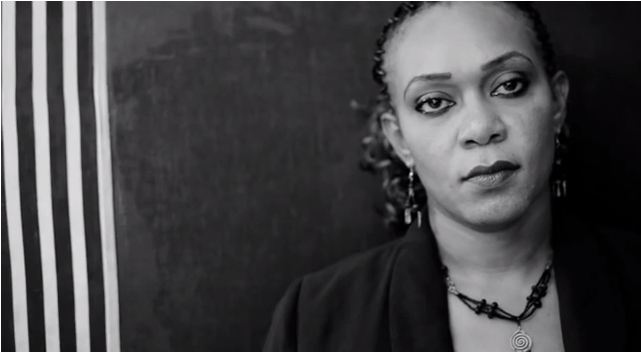
Amira Osman (Image: YouTube)
Amira Osman, a Sudanese engineer and women’s rights activist was last year arrested under the country’s draconian public order act, for refusing to pull up her headscarf. She was tried for “indecent conduct” under Article 152 of the Sudanese penal code, an offence potentially punishable by flogging. Osman used her case raise awareness around the problems of the public order law. She recorded a powerful video, calling on people to join her at the courthouse, and “put the Public Order Law on trial”. Her legal team has challenged the constitutionality of the law, and the trial as been postponed for the time being.
This case is not my own, it is a cause of all the Sudanese people who are being humiliated in their country, and their sisters, mothers, daughters, and colleagues are being flogged.
Fadiamata Walet Oumar — Mali
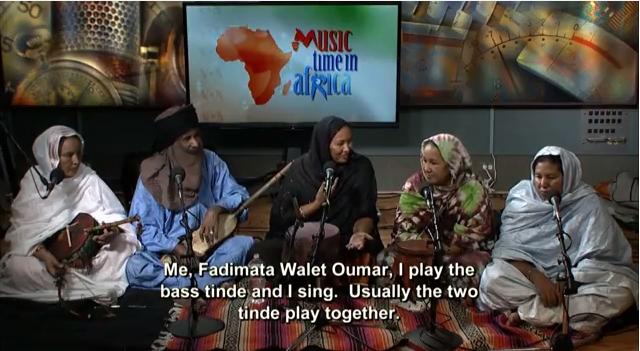
Fadiamata Walet Oumar with her band Tartit (Image: YouTube)
Fadiamata Walet Oumar is a Tuareg musician from Mali. She is the lead singer and founder of Tartit, the most famous band in the world performing traditional Tuareg music. The group work to preserve a culture threatened by the conflict and instability in northern Mali. Ansar Dine, an islamists rebel group, has imposed one of the most extreme interpretations of sharia law in the areas they control, including a music ban. Oumar believes this is because news and information is being disseminated through music. She fled to a refugee camp in Burkina Faso, where she has continued performing — taking care to hide her identity, so family in Mali would not be targeted over it. She also works with an organisation promoting women’s rights.
Music plays an important role in the life of Tuareg women. Our music gives women liberty…Freedom of expression is the most important thing in the world, and music is a part of freedom. If we don’t have freedom of expression, how can you genuinely have music?
Khadija Ismayilova — Azerbaijan

Khadija Ismayilova
Ismayilova is an award-winning Azerbaijani journalist, working with Radio Free Europe/Radio Liberty. She is know for her investigative reporting on corruption connected to the country’s president Ilham Aliyev. Azerbaijan has a notoriously poor record on human rights, including press freedom, and Ismayilova has been repeatedly targeted over her work. She was blackmailed with images of an intimate nature of her and her boyfriend, with the message to stop “behaving improperly”. This February, she was taken in for questioning by the general prosecutor several times, accused of handing over state secrets because she had met with visitors from the US Senate. In light of this, she posted a powerful message on her Facebook profile, pleading for international support in the event of he arrest.
WHEN MY CASE IS CONCERNED, if you can, please support by standing for freedom of speech and freedom of privacy in this country as loudly as possible. Otherwise, I rather prefer you not to act at all.
Jillian York — US
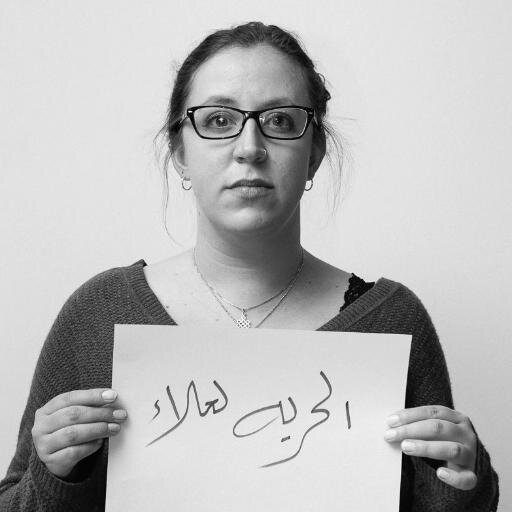
Jillian York (Image: Jillian C. York/Twitter)
Jillian York is a writer and activist, and Director of Freedom of Expression at the Electronic Frontier Foundation (EFF). She is a passionate advocate of freedom of expression in the digital age, and has spoken and written extensively on the topic. She is also a fierce critic of the mass surveillance undertaken by the NSA and other governments and government agencies. The EFF was one of the early organisers of The Day We Fight Back, a recent world-wide online campaign calling for new laws to curtail mass surveillance.
Dissent is an essential element to a free society and mass surveillance without due process — whether undertaken by the government of Bahrain, Russia, the US, or anywhere in between — threatens to stifle and smother that dissent, leaving in its wake a populace cowed by fear.
Cao Shunli — China
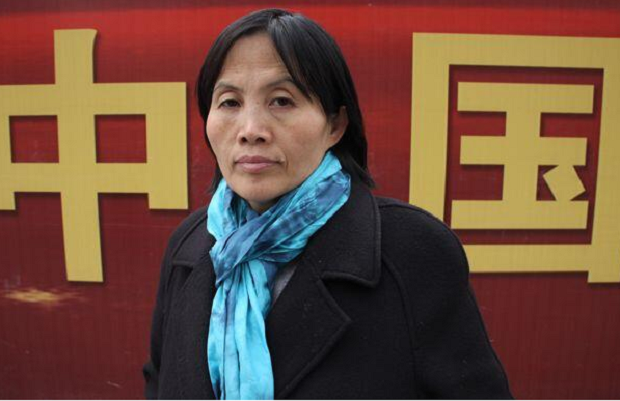
Cao Shunli (Image: Pablo M. Díez/Twitter)
Shunli is an human rights activist who has long campaigned for the right to increased citizens input into China’s Universal Periodic Review — the UN review of a country’s human rights record — and other human rights reports. Among other things, she took part in a two-month sit-in outside the Foreign Ministry. She has been targeted by authorities on a number of occasions over her activism, including being sent to a labour camp on at least two occasions. In September, she went missing after authorities stopped her from attending a human rights conference in Geneva. Only in October was she formally arrested, and charged for “picking quarrels and promoting troubles”. She has been detained ever since. The latest news is that she is seriously ill, and being denied medical treatment.
The SHRAP [State Human Rights Action Plan, released in 2012] hasn’t reached the UN standard to include vulnerable groups. The SHRAP also has avoided sensitive issue of human rights in China. It is actually to support the suppression of petitions, and to encourage corruption.
Zainab Al Khawaja — Bahrain
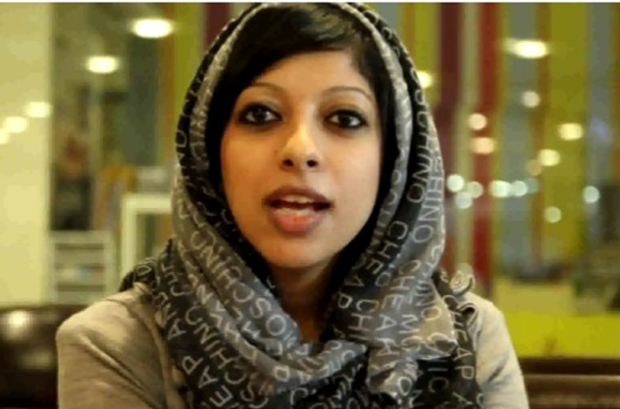
Zainab Al Khawaja
Al Khawaja is a Bahraini human rights activist, who is one of the leading figures in the Gulf kingdom’s ongoing pro-democracy movement. She has brought international attention to human rights abuses and repression by the ruling royal family, among other things, through her Twitter account. She has also taken part in a number of protests, once being shot at close range with tear gas. Al Khawaja has been detained several times over the last few years, over “crimes” like allegedly tearing up a photo of King Hamad bin Isa Al Khalifa. She had been in jail for nearly a year when she was released in February, but she still faces trials over charges like “insulting a police officer”. She is the daughter of prominent human rights defender Abdulhadi Al Khawaja, who is currently serving a life sentence.
Being a political prisoner in Bahrain, I try to find a way to fight from within the fortress of the enemy, as Mandela describes it. Not long after I was placed in a cell with fourteen people—two of whom are convicted murderers—I was handed the orange prison uniform. I knew I could not wear the uniform without having to swallow a little of my dignity. Refusing to wear the convicts’ clothes because I have not committed a crime, that was my small version of civil disobedience.
This article was posted on March 8, 2014 at indexoncensorship.org
28 Feb 2014 | India, News and features, Religion and Culture

(Image: University of Chicago)
Omair Ahmad, author of ‘Jimmy the Terrorist’ and ‘The Storyteller’s Tale’ has written to his publisher, Penguin India, to cancel his contracts so that he does not feel hypocritical criticizing them. Ahmad’s statement follows closely behind a strongly worded letter by author and Booker Prize winner Arundhati Roy, who asked, “You must tell us what happened. What terrified you?”
The reactions by Ahmad, Roy and other Indian authors and columnists have been prompted by Penguin India’s decision to pulp all remaining copies of American author Wendy Doniger’s controversial book – The Hindus: An Alternative History. This decision came after pressure put on the publisher from a lawsuit filed in 2010 by Hindu group Shiksha Bachao Andolan Committee (The Movement to Save Education) which claimed the book contained heresies and factual inaccuracies.
For its part, Penguin India claimed that it settled the four-year suit in part due to the Indian Penal Code that makes it “increasingly difficult for any Indian publisher to uphold international standards of free expression.” It went onto cite section 295A which threatens up to three years imprisonment against those who “with deliberate and malicious intention of outraging the religious feelings of any class of citizens in India, by words, either spoken or written … insults or attempts to insult the religion or the religious beliefs of that class.” International copies of the book are still available. And, predictably, the book can be illegally downloaded over the internet.
Reactions in India have been mixed. There are those who support Penguin’s decision, as there is a worry that the book places forward a highly sexually charged version of Hinduism, offensive to many devout Hindus. Offensive enough for a group to move the Court against such a book, as is their legal right. However, what has shocked many is that Penguin succumbed to pressure to remove the book from the Indian market without their even being a court order forcing them to do so. As a reaction, the Bangalore based Alternative Law Forum has issued a legal notice to Penguin India claiming the publisher has violated freedom of speech laws and its readers’ rights. The Hindustan Times carried an article criticizing Chiki Sarkar, the publisher of Penguin India, for not keeping her word of October 2012 to “take the next injunction we are faced with and really fight it out.” This, to many, is just another case of self-censorship by so-called liberals because of pressure from right-wing fringe groups who “morally police” Indian society. This is indeed a rising trend in India, as is evident by the growing numbers of reports in the news highlighting cases of exhibitions being cancelled and more famously, stopping authors like Salman Rushdie to appear at literary book festivals.
In a passionate editorial, commentator Pratap Bhanu Mehta has hit out at liberals, so called defenders of free speech for failing themselves. As he writes: “Liberal India has been silenced because it never understood that toleration does not, to use Govind Ranade’s phrase, come in halves. You cannot pick and choose when to be tolerant. You cannot choose to be tolerant along partisan lines. Neither can you choose to be tolerant based on what you think are distinctions between good and bad scholarship, serious and scurrilous books. These distinctions are a good basis for criticism; they are not the best basis for deciding whom the law will protect. And R.V. Bhasin, author of a banned book on Islam, will be protected as much as Wendy Doniger. And so it should be. If you want a hundred flowers to bloom, a few weeds will grow as well.”
Bhanu is right. Attacks on freedom of speech aren’t always prompted only by religious groups. It was only in January 2014 that the media reported that ex-bureaucrat Jintender Bhargava’s book India’s national airline, Air India, was being withdrawn by publisher Bloomsbury, with leftover stocks being destroyed, as well as an apology to former civil aviation minister Praful Patel, who has been pilloried in the book as the man who caused the downfall of the airline. Bhargava found that television discussions about his book were cancelled for reasons unknown to him, and despite an ensuing legal battle – ex-minister Patel has filed defamation cases against him which are yet to be settled — the publisher chose to settle the matter with Patel.
In an article on the matter, Medianama reported that the author, Bhargava, chose to keep the rights of the book for himself and is now looking for another publisher or to release the book online. This, the site reports, is possibly “a sign of things to come.”
Could this also be yet another sign of things to come: What it is now being described as the phenomenon of “libel chill” in India. This means using money to start libel suits the moment someone criticizes them. The Hoot reports of yet another case towards the end of 2013, where giant group Sahara India filed a case against Tamal Bandopadhyay, journalist and author and his publisher Jaico India, for damages of a whopping Rs 2 billion and a perpetual injunction restraining them from publishing or circulating or releasing the book, Sahara : The Untold $tory, in any form.
In these cases, what is the role of the publisher? Can Penguin India be held to a higher standard – one that would involve years of costly litigation – or can they be forgiven for taking a business decision that means they give up on their authors who are left to fend for themselves? Should writers of sensitive subjects look to retaining the rights to their books lest they need a new publisher, or explore digital publishing because the trend seems to indicate publishers might not wait for a court order to stop publishing certain books.
The final answer, then perhaps, lies in the solving of “blatant abuse of libel and defamation laws by corporations and individuals in positions of power, to silence critical voices”, as described by Gautam Bhatia in Outlook magazine. He offers a solution: In the interest of free speech the court must protect journalists and authors who do not wilfully or with reckless regard publish what they know to be wrong. As he writes, “it is possible that the pendulum will swing the other way, and the threat of an unrestrained and irresponsible media can never be discounted… undesirable though the prospect of an unaccountable media is, the prospect of a silenced media is far worse.”
The courts must stand up for freedom of expression in India, and publishers and authors need to know that principles of free speech are worth fighting for, and self-censorship isn’t the new order of business. It is absolutely no coincidence that India has been ranked among the worst countries (140 of 180 countries) on the World Press Freedom Index in 2014.
This article was published on 28 February 2014 at indexoncensorship.org











